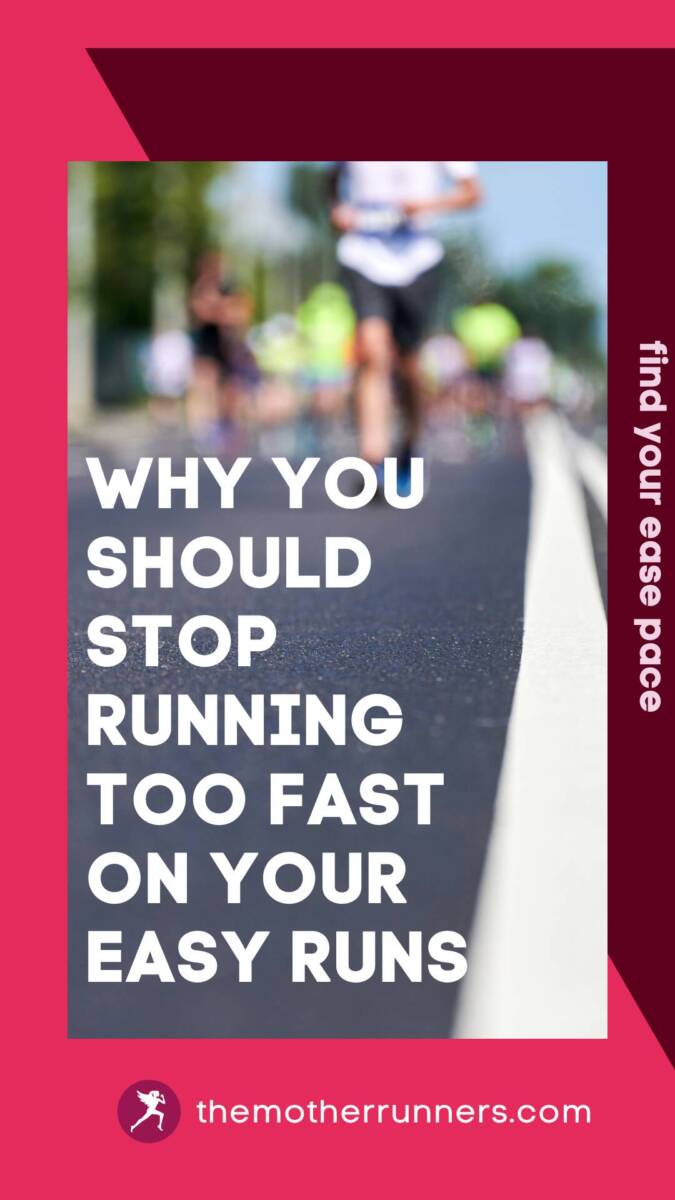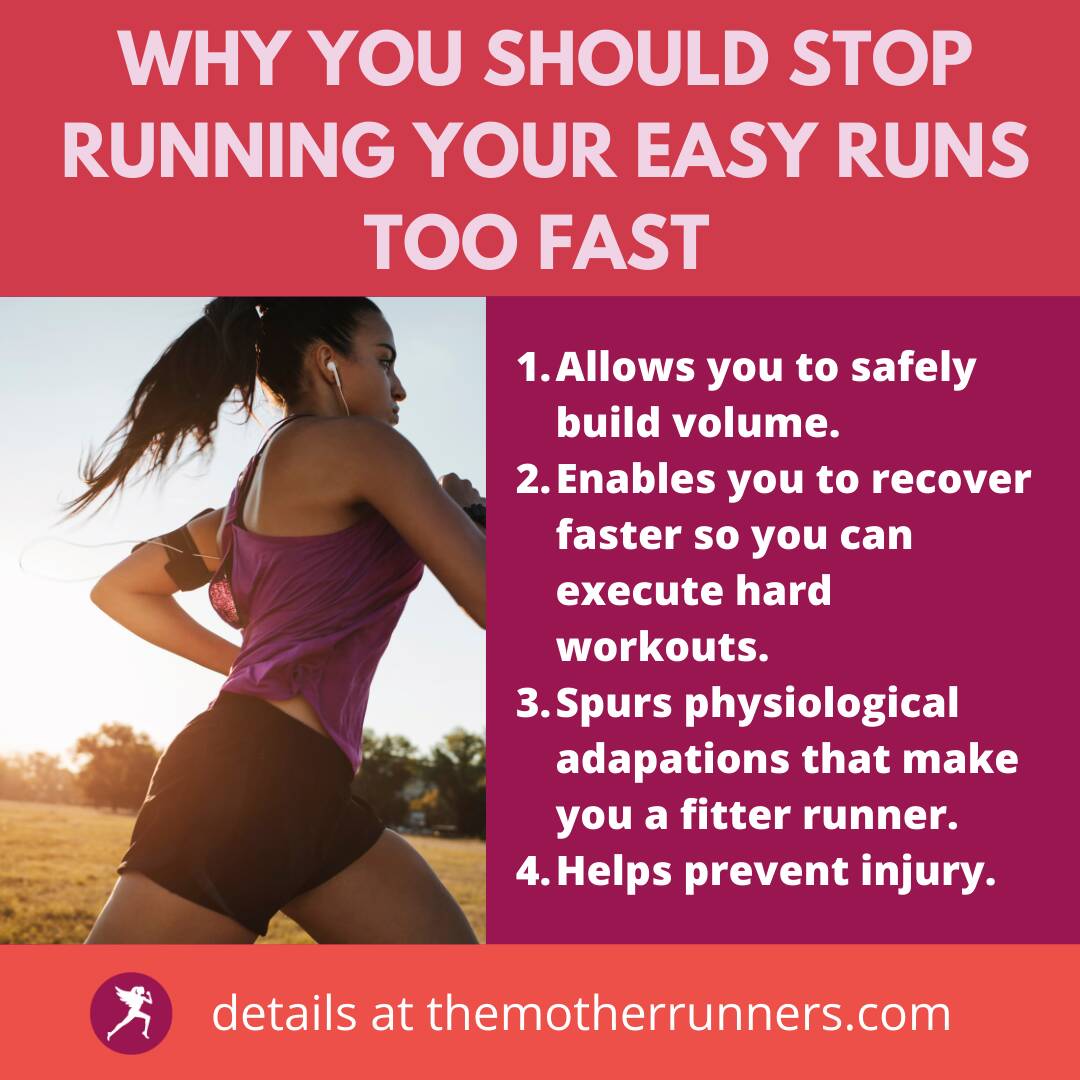An easy running pace is a pace in which you feel in control, comfortable, and can hold a conversation. For most trained recreational runners, about 80 percent of your weekly training volume should be at an easy effort. This allows you to build your training volume, execute hard workouts, spur physiological adaptations that boost running economy, and prevent injury.

One of the most controversial topics in running is easy pace. Runners worry what their easy running pace is compared to others. They think if they run too slow, they will get slower rather than faster. And, they aren’t sure if they are running their easy pace too fast.
The other day, I got a call from of my athletes.
She met some runners (with slower marathon times than her) who ran their easy runs much faster. They invited her to run with them for their long run—but their so-called easy pace was about a minute faster than hers. Should she run with them, she asked?
I advised her not to. And she didn’t—instead beautifully executing her 20 mile long and hitting her goal marathon pace for the final 8 miles (as prescribed).
Download My 10k Training Plans!
But I could tell she was worried she had been doing her training wrong. I mean, how could these runners with slower race times be running their runs faster than her?
In this article, I am going to shed light on why that is, going into a deep dive on all things easy pace.
Related: How to Figure Out Your Marathon Pace
Skip Ahead
- What is easy run pace?
- How often should I run easy?
- Why should I slow down on my easy runs?
- What’s wrong with running too fast on my runs?
- Will running slow make me slow?
- Can you run your easy runs too slow?
- Is easy pace the same as your long run pace?
- Why do some runners run a faster pace on easy days?
- How to Force Yourself to Run Easier:
Let’s go!
What is easy run pace?
I like to say that easy pace is not a number, it’s a feeling. Therefore, an easy run pace must have the 3 Cs: Comfortable, Controlled and Conversational.
- Comfortable: An easy run pace is a running pace a runner can hold that feels This is a pace that feels almost effortless.
- Controlled: You feel like you can run forever at this pace. When you finish running at an easy running pace, you feel energized rather than gassed.
- Conversational: Easy is a conversational pace where you can speak in multiple sentences at a time during this pace. You aren’t gasping for air or waiting for the run to be over with. Test this with the talk test—being able to talk (or sing!) while running.
If you don’t have the 3 Cs, then you are likely running your easy pace too fast.
You can also find your easy running pace by running at:
- 60-75% of max heart rate (though some people have high heart rates on easy efforts for various reasons. Read more about that here.)
- Running a 3-4/10 on the Rate of Perceived Exertion scale (which takes experience to calibrate. Read more about running by RPE here).
- Using Coach Jack Daniels’ VDOT running calculator where you input a recent race time and it calculates easy pace ranges along with training paces.

Related: How Can I Tell If I’m Running Too Much?
There are some generic formulas that will say your easy effort is one to two minutes slower than your marathon pace, for example. But these formulas change according to your race pace as well as training load. For example, for runners who run a 4:15 and above marathon time, their average pace on long runs is likely their marathon pace.
Therefore, the above ways to calculate your easy pace are more appropriate.
How often should I run easy?
A majority of your training should be easy miles.
- For most trained runners, about 80 percent of their weekly volume will be at an easy running pace.
- For new runners, 100 percent of their runs will be at an easy pace as their body adapts to the training load.
- Advanced runners with a high weekly mileage of 70+ may run about 90 percent of their training runs at an easy pace.
Why should I slow down on my easy runs?
You should run an easy pace because it allows your body to develop the physiological changes to become a better runner without putting you at risk for injury and allowing you to recover for your next big training run.
(Read more about the benefits of an easy running pace here.)
Many people have a tough time slowing down on their easy runs because of ego or fear that running slow will make them slow.

If this is you, remind yourself of these facts:
Running easy allows your body to become better at running longer and faster by increasing capillary density to move oxygen to working muscles, boosting the amount of the energy factories known as mitochondria, improving your body’s ability to use the reliable energy source of fat for fuel along with carbohydrates, and increasing aerobic enzyme activity—important for energy production (source).
Related: How to Safely Increase Mileage
What’s wrong with running too fast on my runs?
One of the biggest mistake runners make, including novice runners and experienced runners, is running too fast on their easy runs. While it seems counterproductive to slow down on your easy runs, it allows your body to adapt in a healthy way to the training stress, so you can prevent injuries and run consistently.
If you run the “gray zone” or at moderate pace for every run, you are at greater risk for a running injury as your cardiovascular system develops faster than your musculoskeletal system (source).
Also, running in the gray zone on easy days means you will start accumulating lactate (a byproduct of energy production which makes your legs feel heavy) in your blood which will likely make you have to stop or end your run early—not ideal (source).
Related: How Much Should You Run in a Day

Furthermore, you are at greater risk for being too fatigued to complete following runs or execute workouts—diminishing your overall training.
You also don’t optimize the physiological adaptations such as fat oxidation when running above your aerobic threshold or lactate threshold (the pace at which your body isn’t able to clear lactate).
Finally, running easy gives you the added benefit of boosting mileage, accelerating recovery, and improving fitness in a safe and non-stressful way.
Related: Is it Ok to Run on Tired Legs?
Will running slow make me slow?
No, running slow will not make you slow if you also have speed stimulus included in your training. If you run the same pace every day for months or years on end, then you will not get faster. Your body has nothing to stimulate adaptations.
Developing an aerobic base with several months of mostly easy running, runners who want to get faster need to run faster up to about 20 percent of their training volume.
You can do this in the form of strides, surges (faster running intervals of about 20 seconds embedded in your run), and speed workouts including progressions, tempo runs, steady runs, VO2 max workouts, and race pace miles. (A running coach can help you program these!).
Related: How Accurate is Your Garmin VO2 Max?
Can you run your easy runs too slow?
No, you can’t run your easy runs too slow. The point of an easy run is to get the physiological benefits of running without the added impact and stress of running fast.
However, that said, you don’t want your easy pace to feel uncomfortable and biomechanically awkward. Run what feels comfortable.
I have runners who come to me very strict on what their heart rate zones are on their easy runs (wanting to execute zone 2 training). I often tell them to stress less about hitting certain heart rate zones especially if that pace required to run in a certain zone feels awkward.
Related: Is it Ok to Split Up My Long Run?
Is easy pace the same as your long run pace?
Yes, in most cases an easy pace is the same as your long run pace, unless you have specified race pace miles in your long run.
The main goal of long runs is to get your body used to running long. It needs to build the muscular and cardiovascular strength and endurance to be moving for that long. It also needs to learn how to process fuel for energy for long durations.
For this reason, faster running during long runs is only appropriate after a base on long run endurance is built and the runner is ready to start sharpening their paces.
Related: Should You Ditch Your Running Watch?
Why do some runners run a faster pace on easy days?
The easy pace of runners is based on fitness, genetics, and training load.
- Fitness: The easy pace of an experienced runner with a higher fitness level will be faster than a new runner with little development of their aerobic system, for example.
- Genetics: A runner who has more slow twitch muscle fibers will run their easy pace faster than runners with more fast twitch muscle fibers (source). This explains why some runners may have the same race paces, but their easy pace zones differ.
- Training load: Finally, if your training load is high, your easy pace will likely be a slower pace than someone who is only in base phase, for example. Your hard days will be taxing, making recovery more important on easy run days. I know in my peak marathon training phase, my legs feel fatigued on easy runs days, so my easy pace slows.
Related: What is Cumulative Fatigue in Marathon Training
How to Force Yourself to Run Easier:
If you have a hard time slowing down on your easy runs, here are some ways to run easier:
- Wear max cushioned shoes like the Hoka Bondi. These shoes are heavier so likely make you slow down.
- Listen to podcasts or slow music instead of up-tempo music. Or listen to nothing at all but the sound of nature and your breath.
- Run with a friend who is slower than you.
- Run early in the morning when your body is still waking up.
- Ditch the tech. Get off Strava and don’t look at your watch so you can run by feel.
- Run by heart rate with the HR on your watch screen over pace.
The most important thing is to remember the purpose of an easy run—to get fitter without taxing the body—so that you can show up healthy and fit on race day, and be running for a long long time.
If you want guidance with your running goals and training, check out my run coaching services. Also, be sure to check out my free training plans:
- Postpartum Training Plan
- After a Break Training Plan
- 5k Training Plans
- 10k Training Plans
- Half Marathon Training Plans
- Marathon Training Plans
- Strength Training Plan
